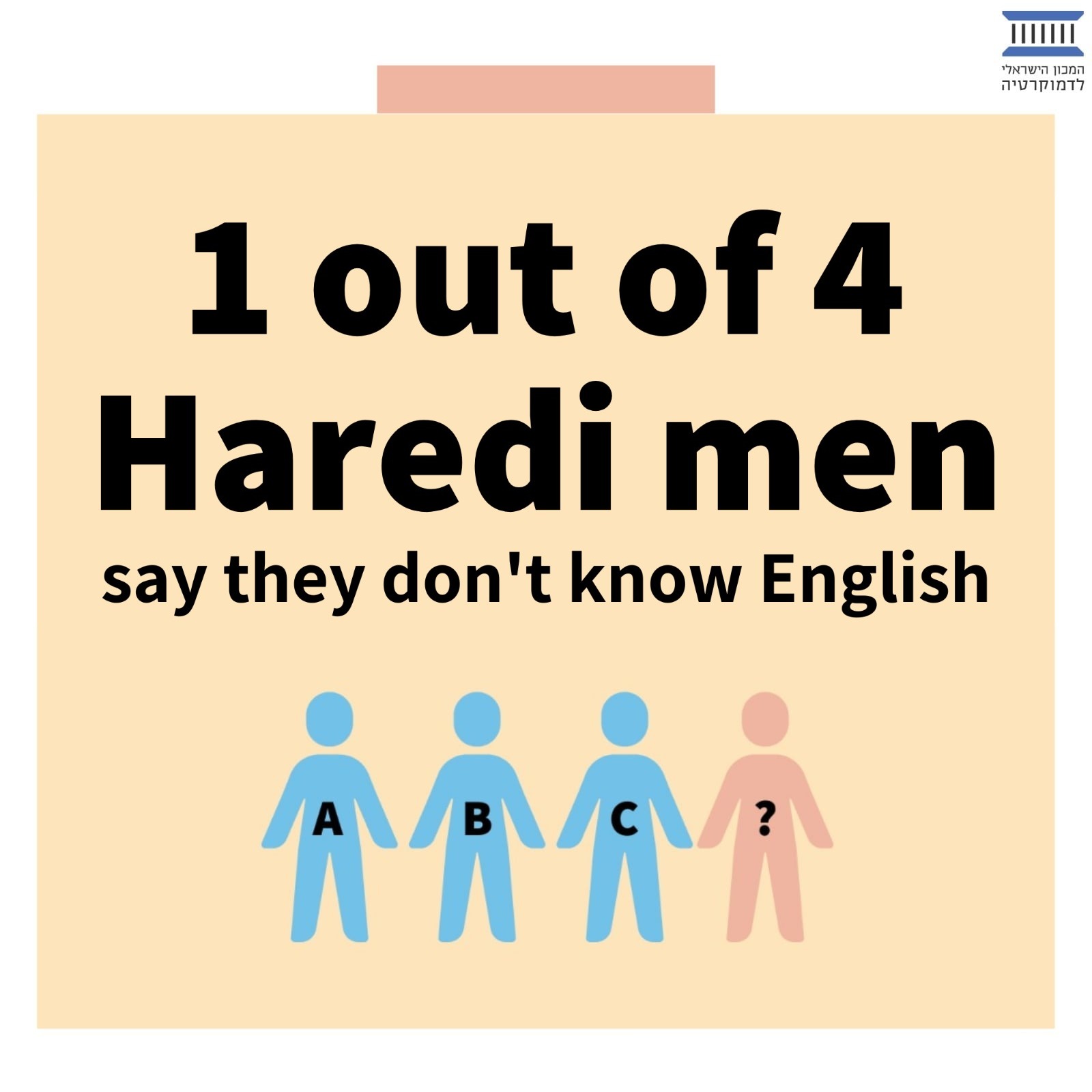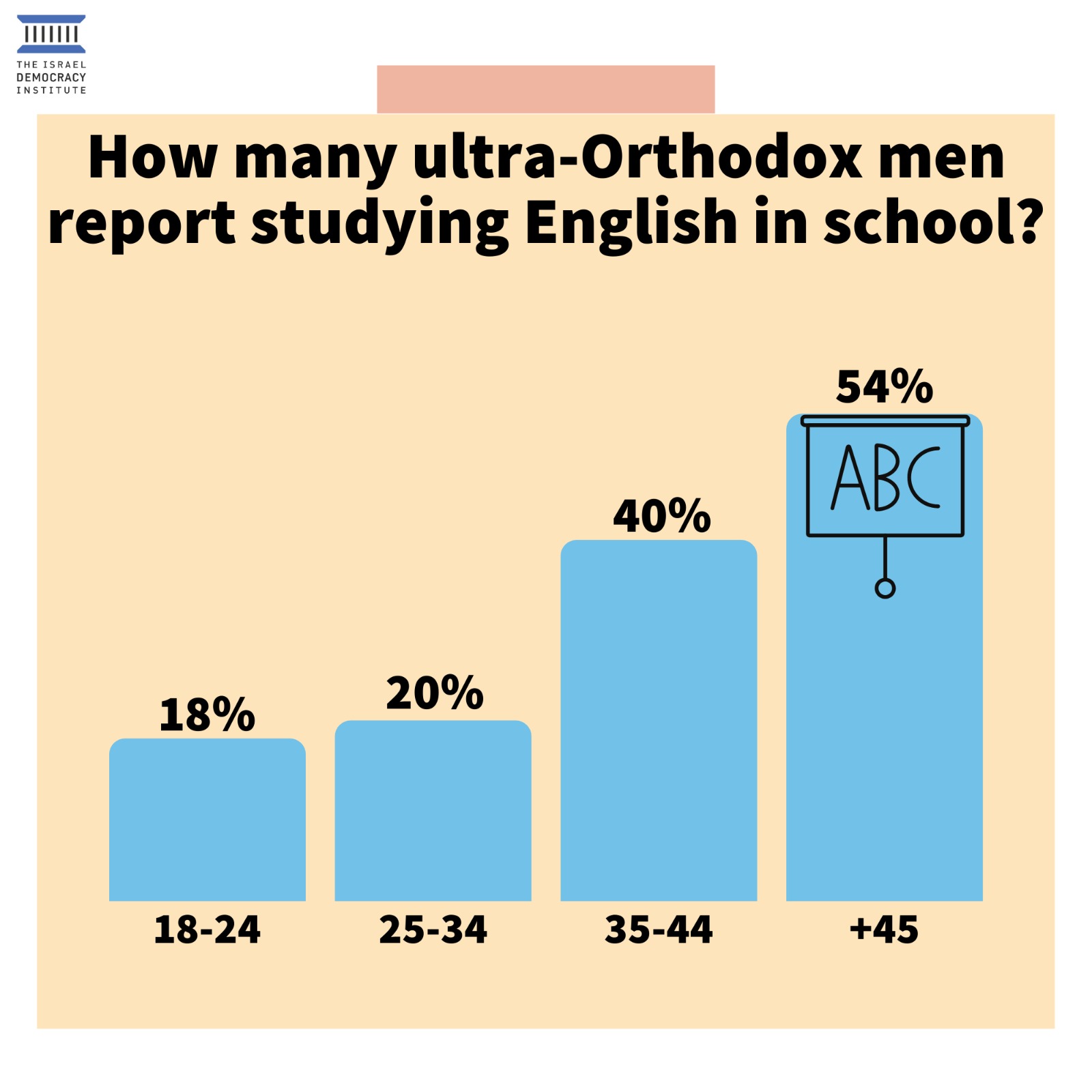English Studies for Ultra-Orthodox Boys - Study
A new IDI study finds that 26% of ultra-Orthodox men say they don’t know English at all and an additional 28% say their English is "poor."

Summary: Main Findings
• 26% of ultra-Orthodox men report that they have no knowledge of English, and an additional 28% rate their English as "poor".
• 30% of ultra-Orthodox men who graduated from ultra-Orthodox schools studied English as in elementary school. The younger the respondents, the lower the percentage who studied English at elementary school: 54% of ultra-Orthodox male graduates of ultra-Orthodox education aged 45+ studied English, compared with just 18% of those aged 18–24. Among parents of school-age boys, 24% reported that their sons currently study English.
• 34% of ultra-Orthodox parents support having their sons study English at school, while 44% expressed interest in their sons studying English in a non-formal education setting (in afterschool frameworks). Among parents of boys in schools in which English is not taught, 23% are interested in their sons learning English in school and 36% are interested in them learning English outside of school.
• Support for English studies for boys is stronger among younger ultra-Orthodox parents than among the older age groups, and stronger among men than among women.
Introduction
This document offers an initial review of the findings of a survey conducted by the Israel Democracy Institute as part of a study of English in the ultra-Orthodox education system. The review focuses on findings relating to English studies for boys. English is taught in more schools for girls, however only rarely is it included in the curriculum at schools for boys.
Ultra-Orthodox Men's Fluency in English
26% of ultra-Orthodox men say they don’t know English at all and an additional 28% say their English isn’t good. Thus, around half have very low English skills and an additional 19% say their English is mediocre. 7% say they know English on the level of a mother tongue and 18% say their English is good or pretty good.
How would you self-define your level of English (%, ultra-Orthodox men)
English Studies in Schools
In some ultra-Orthodox educational institutions for boys, English is totally absent from the curriculum, while in others it is included, but usually only for a few hours a week and on a low level. The survey included the following question: “Did you study English at school?” Among the male ultra-Orthodox respondents who attended ultra-Orthodox schools, 30% had studied English. Analyzing the responses by age reveals an interesting trend.
Ultra-Orthodox men who studied English at school as children (by age, %)

The data reveal a continuing decline over time in English studies for boys in ultra-Orthodox educational institutions. Findings indicate that 54% of male graduates of ultra-Orthodox education aged 45+ studied English at school, with this figure dropping steadily with age—to 40% of men aged 35–44, 20% of those aged 25–34, and just 18% of respondents aged 18–24.
Parental interest in children's' study of English by educational setting (parents of school-age sons, %)
Parents of boys studying English in school Parents of boys not studying English in school
As can be expected, parents whose sons currently study English in school expressed greater support for English studies. However, the data show that there is also a certain degree of support for English studies among parents of boys not currently being taught English: 23% are interested in their sons learning English in school, and 36% expressed an interest in English studies in non-formal educational settings.
The survey was conducted in December 2021, among a sample comprised 564 ultra-Orthodox Israeli men and women, constituting a representative sample of the adult ultra-Orthodox population in Israel, aged 18 and above. The maximum sampling error is ±4.21% at a confidence level of 95%. The field work was carried out by the Askaria survey institute, which specializes in the ultra-Orthodox population.
